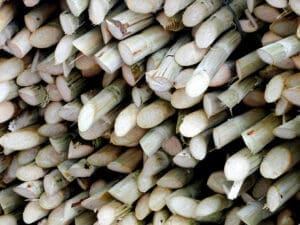Switched to Cane Sugar from Beet Sugar to be GMO free
Published on September 8, 2014
Sugar is synonymous with our food storage stockpile to the point that it adds a sense of normalcy. However, it’s very important to know the source of your sweet stuff. There are widely two types of sugars; beet and cane sugar. Cane sugar is manufactured from sugar cane, which is a natural grass that grows up to 20 feet tall. Compared to Beet sugar, cane sugar is pure organic and the growth of sugarcane cannot be altered scientifically to include chemicals such as those found in the beet plants. Cane sugar retains most of the nutrients found in sugar cane, which include; six vitamins, antioxidants, seventeen amino acids and eleven minerals.
As much as cane sugar should also be regulated to about 10 teaspoons per day, the organic element in it gives it an edge over beet sugars even if they were to be taken at half proportions compared to cane sugar. Cane sugar is made by squeezing out the cane juice, which is very rich in vitamins, minerals and molasses before it is evaporated and crystalized. The finished products is normally an organic sugar perfect for sweetening tea and best for sweetening baked products.
The advantages of switching to cane sugar from beet sugar are very many especially for a farm that practices strict organic farming. Sugar cane fields that are not treated with synthetic fertilizers and herbicides give a guarantee that the final product is pure organic sugar rich with many important nutrients. This is the quality that people look out for and as soon as they discover that the sugar they are consuming is GMO free, the demand for organic sugar rises tremendously. Also remember that there are no animal by-products used to manufacture organic sugar and this factor favors even vegetarians.
With the rising demand of organic sugar all over the world, sugar cane farmers are now reaping more benefits and are more encouraged to increase their acreage of sugar plantations to meet the demand. Ultimately, scientists have conceded the fact that beet sugar cannot be depended on since the chances of planting the beets with GMO seeds and using chemicals to process are higher than the chances of having the beets as natural as the sugar canes.
Today, diseases such as cancer and hypertension are increasing among young people and it has all been attributed to our eating habits, which include consuming large amounts of non-organic sugars. It is now quite obvious why it is necessary to switch to cane sugar from beet sugar to be completely GMO free when it comes to a product we consume daily; sugar.

